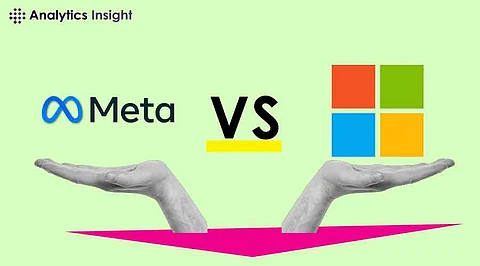

Meta Platforms (META) and Microsoft Corporation (MSFT) are two of the most influential tech companies, commanding significant attention from investors. Both companies have strong fundamentals and are deeply invested in future technologies such as artificial intelligence, cloud computing, and augmented reality. While they excel in different areas, the critical question for investors is: which stock offers higher returns?
This article provides an in-depth comparison of META and MSFT based on key financial metrics, growth potential, and market performance.
Current Price: $574.32
Market Capitalization: $1.45 Trillion
Dividend Yield: 0.35%
P/E Ratio (TTM): 26.81
Net Income (FY): $39.10 Billion
Revenue (FY): $134.90 Billion
Beta (1Y): 0.99
Meta has shown strong revenue growth driven by its focus on AI, the metaverse, and advertising. The company’s investments in Reality Labs (metaverse development) are seen as long-term strategies that may provide exponential returns in the future.
Current Price: $423.46
Market Capitalization: $3.15 Trillion
Dividend Yield: 0.78%
P/E Ratio (TTM): 34.91
Net Income (FY): $88.14 Billion
Revenue (FY): $245.12 Billion
Beta (1Y): 1.16
Microsoft boasts higher revenue and net income, reflecting its dominance in enterprise software, cloud computing, and productivity tools. Its strategic investments in AI, including its partnership with OpenAI, are reshaping its business landscape.
Advertising Revenue: Advertising remains META’s largest revenue driver, accounting for nearly 98% of total revenue. AI-driven algorithms are improving ad targeting, resulting in better returns for advertisers and more revenue for the company.
Metaverse Development: Meta’s significant investments in AR and VR aim to revolutionize how people interact online. While Reality Labs remains unprofitable, it has the potential to redefine digital ecosystems.
AI Integration: META is leveraging AI to enhance user experience across platforms such as Facebook, Instagram, and WhatsApp.
Cloud Computing: Microsoft Azure has emerged as a leader in the cloud computing market, with substantial contributions to MSFT’s revenue growth.
Generative AI: As the largest investor in OpenAI, Microsoft is integrating ChatGPT into its products, including Office 365 and Azure, to strengthen its foothold in generative AI.
Enterprise Software: Microsoft dominates the enterprise software market with products like Office 365 and Dynamics, ensuring steady recurring revenue.
1-Year Beta: 0.99 (indicating moderate market volatility relative to the overall market).
Stock Momentum: Meta has gained significant momentum, largely due to its cost-cutting measures and renewed focus on AI and profitability.
Minimum: $475 (-17.29%)
Average: $653.57 (+13.80%)
Maximum: $811 (+41.21%)
1-Year Beta: 1.16 (higher volatility, reflecting more aggressive movements).
Stock Momentum: Microsoft’s stock has shown consistent upward movement, fueled by strong performance in Azure and growing adoption of AI technologies.
Minimum: $425 (+0.36%)
Average: $501.48 (+18.42%)
Maximum: $600 (+41.69%)
Relative Strength Index (RSI): 52.47 (Neutral).
Simple Moving Average (200-Day): $515.53 (Buy Signal).
Key Indicator: Most moving averages indicate a bullish trend, suggesting META is likely to maintain its upward trajectory in the short term.
Relative Strength Index (RSI): 53.08 (Neutral).
Simple Moving Average (200-Day): $422.03 (Buy Signal).
Key Indicator: Similar to META, MSFT’s moving averages show bullish signals, underscoring its strength in the market.
Meta’s dividend yield is 0.35%, which is relatively low. This aligns with the company’s focus on reinvesting profits into long-term growth projects, such as the metaverse and AI initiatives.
Microsoft offers a higher dividend yield of 0.78%, making it more attractive to income-focused investors. Its robust cash flow and consistent profitability ensure that dividends are well-supported.
Meta’s growth is driven by its AI innovations and dominance in social media advertising. The company’s investments in the metaverse may yield high returns in the long term, although the timeline for profitability remains uncertain.
Microsoft’s growth is rooted in its enterprise software dominance and cloud computing expansion. Its strategic focus on generative AI and partnerships with AI startups position it as a leader in the AI revolution.
Dependence on Advertising: Over-reliance on advertising revenue makes META vulnerable to economic downturns that affect ad spending.
Metaverse Investments: While the metaverse holds promise, META’s heavy spending in this area has yet to yield significant returns.
Cloud Competition: Intense competition in the cloud space, especially from Amazon AWS and Google Cloud, could pressure Microsoft’s margins.
High Valuation: With a P/E ratio of 34.91, Microsoft’s valuation may deter some investors.
Meta Platforms: Meta’s cost-cutting measures and focus on profitability provide a strong foundation for short-term growth. Its average price forecast suggests a 13.80% return in 2025.
Microsoft Corporation: Microsoft’s steady revenue streams and AI-driven growth point to a solid 18.42% average return by 2025.
Meta Platforms: Meta’s long-term potential lies in its metaverse initiatives and AI integration. However, the high-risk, high-reward nature of these projects requires patience from investors.
Microsoft Corporation: Microsoft’s diversified business model and leadership in cloud computing and AI provide a more balanced and predictable long-term growth trajectory.
Choosing between META and MSFT depends on an investor’s goals and risk tolerance. Meta Platforms offers significant growth potential through its innovations in AI and the metaverse but comes with higher risks. Microsoft Corporation, with its strong cash flow, consistent profitability, and leadership in cloud and AI, presents a safer investment option with steady returns.
For risk-tolerant investors seeking high growth, META might be the better choice. For those prioritizing stability and dividends, MSFT stands out as the stronger contender. Both stocks, however, remain at the forefront of technological innovation, making them valuable additions to any portfolio.
